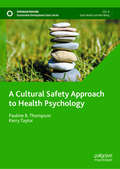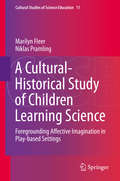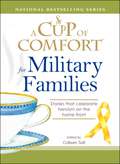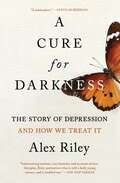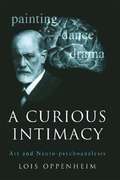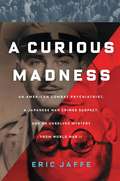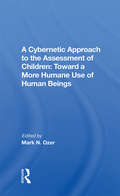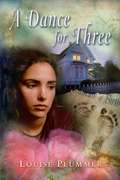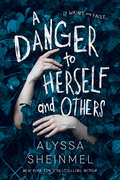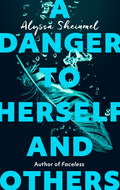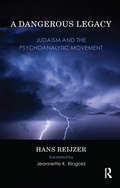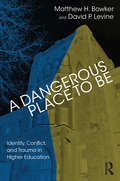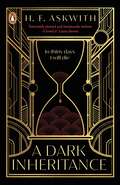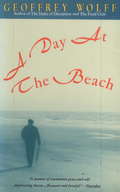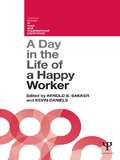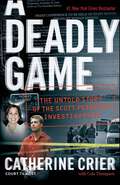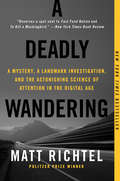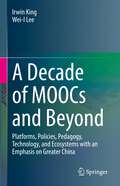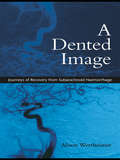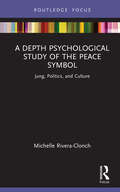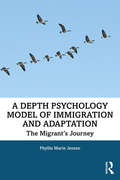- Table View
- List View
A Cultural Safety Approach to Health Psychology (Sustainable Development Goals Series)
by Kerry Taylor Pauline B. ThompsonThis book applies the concept of cultural safety to the field of health psychology in a US context as a means to achieve health equity. First developed in New Zealand by Māori midwives, cultural safety can be understood as both a philosophy and a way of working within a social model of health as an alternative approach to understanding health and illness. Health, social, and human service professionals are at the forefront of interactions with a range of people who often experience disparities in health and social outcomes. In thirteen chapters, the authors explore the social determinants of health; the practices and pitfalls of intercultural communication; and community capacity, resilience, and strengths as correctives to discourses of deficiency. The book concludes with a comparative look at cultural safety in different national contexts, and a discussion of the value of critical reflective practice. Complete with chapter objectives, scenarios, suggested readings and films, and questions for critical thinking, this book is an invaluable resource for students and practitioners alike in health psychology and related fields, and a vital contribution to the literature on cultural safety.
A Cultural-Historical Study of Children Learning Science: Foregrounding Affective Imagination in Play-based Settings (Cultural Studies of Science Education #11)
by Marilyn Fleer Niklas PramlingThis book moves beyond the traditional constructivist and social-constructivist view of learning and development in science. It draws upon cultural-historical theory in order to theorise early childhood science education in relation to our currently globalised education contexts. The book argues that concept development in science for young children can be better theorised by using Vygotsky's concept of Imagination and creativity, Vygotsky's theory of play, and his work on higher mental functions, particularly the concept of inter and intrapsychological functioning. Key concepts are extracted from the theoretical section of the book and used as categories for analysis in presenting evidence and new ideas in the second section of the book. In this second part of the book, the authors examine how science knowledge has been constructed within particular countries around the globe, where empirical research in early childhood science education has occurred. The third part of the book examines the nature of the encounter between the teacher and the child during science learning and teaching. In the final part of the book the authors look closely at the range of models and approaches to the teaching of early childhood science that have been made available to early childhood teachers to guide their planning and teaching. They conclude the book with a theoretical discussion of the cultural-historical foundation for early childhood science education, followed by a model of teaching scientific concepts to young children in play-based settings, including homes and community contexts.
A Cup of Comfort for Military Families
by Colleen SellA collection of stories about military families.
A Cure for Darkness: The Story of Depression and How We Treat It
by Alex RileyA fascinating look at the treatment of depression, blending journalism, science, history, and memoir, by an award-winning science writer.What is depression? Is it a persistent low mood or a complex range of symptoms? Is it a single diagnosis or a diversity of mental disorders requiring different treatments? In A Cure for Darkness, science writer Alex Riley explores these questions, digging into the long history of depression and chronicling the lives of psychiatrists and scientists who sought cures for their patients. Since 2015, Riley has received both cognitive behavioral therapy and antidepressants for his own depression. Throughout his treatment, he wondered—are antidepressants effective? Do short-term talking therapies actually work? And what treatments are on the horizon for those who don&’t respond to these first-line treatments? Expanding from his own experience, he tracks treatments through history, from the &“talking cure&” to electroconvulsive therapy to magic mushrooms. With depression fast becoming the leading burden of disease around the world, the future of mental healthcare depends not just on the development of new therapies, but on increasing access for people who are currently without. Reporting on the field of global mental health from its colonial past to the present day, Riley highlights a range of scalable therapies, including how a group of grandmothers stands on the frontline of a mental health revolution. Weaving in personal and family history, A Cure for Darkness is a gripping narrative journey and a surprisingly hopeful work that delves deep into the science of mental health.
A Curious Intimacy: Art and Neuro-psychoanalysis
by Lois OppenheimWhat can neuroscience contribute to the psychodynamic understanding of creativity and the imagination? A Curious Intimacy is an innovative study into the interrelation between art and neuro-psychoanalysis which significantly narrows the divide between the humanities and the sciences. Situating our grasp of the creative mind within the historical context of theories of sublimation, Lois Oppenheim proposes a change in paradigm for the study of the creative process, questioning the idea that creativity serves, above all, the reparation of early object relationships and the resolution of conflict. The book is divided into two parts. Part One, Art and the Brain, introduces the field of neuro-psychoanalysis and examines the contribution it can make to the discussion of gender and art. Part Two, A New Direction for Interdisciplinary Psychoanalysis, draws on the verbal and visual artistry of Samuel Beckett, Paul Klee and Martha Graham to put to the test the proposed new direction for applied psychoanalysis. Lois Oppenheim concludes by addressing the future of psychoanalysis as it becomes increasingly informed by neuroscience and raising questions about what the neurobiology of emotion and feeling has to tell us about the creative experience of an individual and what might constitute a 'neuro-psychoanalytic aesthetics'. A Curious Intimacy will have great appeal for all those interested in the study of imagination and creativity. It will also be of particular interest to students across the humanities and sciences and to psychotherapists and psychoanalysts wanting to explore the contribution that neuro-psychoanalysis can make to our understanding of the creative process.
A Curious Madness: An American Combat Psychiatrist, a Japanese War Crimes Suspect, and an Unsolved Mystery from World War II
by Eric JaffeFrom an "illuminating and entertaining" (The New York Times) young writer, the story that explores the fateful intersection of two men at the Tokyo war crimes trial that followed World War II: a Japanese nationalist charged with war crimes and the American doctor assigned to determine his sanity-and thus his fate. <P><P> In the wake of World War II the Allied forces charged twenty-eight Japanese men with crimes against humanity during the Tokyo war crimes trial. At their conclusion, seven were hanged for their war crimes and almost all the others served lengthy prison sentences. <P><P>Shumei, a brilliant ideologue, was the only civilian among the indicted "Class-A" suspects. In the years leading up to World War II, Okawa had outlined a divine mission for Japan to lead Asia, prophesized a great clash with the United States, planned coups d'etat with military rebels, and financed the assassination of a Prime Minister. <P><P> Beyond "all vestiges of doubt," concluded a then-classified American report prepared in 1946, "Okawa moved in the best circles of nationalist intrigue. " On the first day of the trial, Okawa made headlines around the world by slapping star defendant Tojo Hideki on the head. Had Okawa lost his sanity? Or was he faking madness to avoid a grim punishment? <P><P>A US Army psychiatrist in occupied Japan-the author's own grandfather-was charged with determining whether Okawa was fit to stand trial. He'd seen madness his whole life, from his home in Brooklyn to the battlefields of Europe, and now his seasoned eye faced the ultimate test. A Curious Madness is the suspenseful tale of each man's journey to this climactic historical moment.
A Cybernetic Approach To The Assessment Of Children: Toward A More Humane Use Of Human Beings
by Mark OzerThis collection addresses the application of the principles of cybernetics to the methodology of assessment of function in children. The authors suggest that an awareness of the issues of control and informational feedback exemplified by cybernetics leads to new ways of thinking about both the process of gathering data and the type of data sought.
A Dance For Three
by Louise PlummerWhen fifteen-year-old Hannah becomes pregnant and her rich, popular boyfriend claims he is not responsible, she is forced to face some hard facts about her life. For high school readers.
A Danger to Herself and Others
by Alyssa SheinmelGirl, Interrupted meets We Were Liars in this gripping new novel from New York Times bestselling author Alyssa Sheinmel. <P><P>Four walls. One window. No way to escape. <P><P>Hannah knows there's been a mistake, She doesn't need to be institutionalized. What happened to her roommate at that summer program was an accident. <P><P>As soon as the doctor and judge figure out that she isn't a danger to herself or others, she can go home to start her senior year. Those college applications aren't going to write themselves. Until then, she's determined to win over the staff and earn some privileges so she doesn't lose her mind to boredom. <P><P>Then Lucy arrives. Lucy has her own baggage, and she's the perfect project to keep Hannah's focus off all she is missing at home. But Lucy may be the one person who can get Hannah to confront the secrets she's avoiding-and the dangerous games that landed her in confinement in the first place.
A Danger to Herself and Others: From the author of Faceless
by Alyssa SheinmelFrom the author of FACELESS 'Devastating. This is already one of my favourite books of the year' Irish Times'The author's cunning deployment of information keeps the reader guessing' Financial TimesOnly when she's locked away does the truth begin to escape...Seventeen-year-old Hannah Gold has always been treated like a grown up. As the only child of two New York professionals, she's been traveling the world and functioning as a miniature adult since the day she was born. But that was then. Now, Hannah has been checked into a remote treatment facility, stripped of all autonomy and confined to a single room. Hannah knows there's been a mistake. What happened to her roommate that summer was an accident. As soon as the doctor and judge figure out that she isn't a danger to herself or others, she can get back to her life of promise and start her final year at school. Until then, she's determined to win over the staff and earn some privileges so she doesn't lose her mind to boredom.But then she's assigned a new roommate. At first, Lucy is the perfect project to keep Hannah's focus off all she is missing at home. But Lucy may be the one person who can make Hannah confront the secrets she's avoiding - and the dangerous games that landed her in confinement in the first place.Gripping, heartwrenching and powerful, A Danger to Herself and Others is Girl, Interrupted meets We Were Liars in this new novel from New York Times bestselling author Alyssa Sheinmel.
A Dangerous Legacy: Judaism and the Psychoanalytic Movement
by Hans ReijzerOn 23rd July 1908 Sigmund Freud wrote to his colleague Karl Abraham: "Rest assured that if my name were Oberhuber an obviously non-Jewish name, in spite of everything my innovations would have met with far less resistance."From its beginning, psychoanalysis has been seen as a Jewish affair, and psychoanalysts have always been afraid of ending up in the position of the Jew - that of the outsider. In A Dangerous Legacy: Judaism and Psychoanalysis Hans Reijzer examines how psychoanalysts have managed that fear, in the recent past and in the present. During his research, which led him to Vienna, Paris, Amsterdam, London, Jerusalem, Hamburg, and Durban, Reijzer encountered malicious as well as enlightening statements, situations, and incidents. A Dangerous Legacy is a striking study of an interesting area of research. Reijzer's conclusion is surprising: stereotypes about Jews are a factor not only in the everyday world but also in the psychoanalytic world as soon as Jews take part in it.
A Dangerous Place to Be: Identity, Conflict, and Trauma in Higher Education
by Matthew H. Bowker David P. LevineOver the past several decades, colleges and universities in the United States and United Kingdom have made significant commitments to increasing diversity, most notably regarding race and gender. The result has not, however, been an amelioration of conflict over matters of difference. Instead, there has been continuing, if not increasing, conflict and strife in universities, often reflecting conflict in the larger society. A Dangerous Place to Be examines identity-based conflict in colleges and universities, analyzing the actions of students, teachers, administrators, and educational organizations as efforts to manage dilemmas and disturbances arising in the process of identity formation.
A Dark Inheritance
by H. F. Askwith'A powerful, heart-racing story of family, fate, and writing your own destiny. Intricately plotted and luminously written - I loved it.' Laura Steven, author of The Society for Soulless GirlsOnce I had four brothers. Three of them are dead. I am next.Felix Ashe is sure of only one thing. In thirty days, on his eighteenth birthday, he will die. He might be the only one convinced of this, but the gruesome deaths of his three brothers before him seem to point to only one thing: a curse, one doomed to stop anyone inheriting his family's incredible fortune.Felix doesn't care about money, or himself, particularly. It's hard to have a stake in the future when you know you haven't got one. But he does care about his little brother Nick, very much. And when an opportunity to break the curse appears to present itself, it's impossible not to heed its dark call.Soon long-buried secrets will take Felix to the darkest underbelly of Jazz-Age New York, to the far-flung wilds of the Yorkshire moors and back again. And bound to everything is a deadly secret society who will either be Felix's downfall . . . or his one chance at redemption.The Great Gatsby meets The Inheritance Games in this gloriously twisty thriller, perfect for fans of #DarkAcademia and Leigh Bardugo's Ninth House
A Dark Night in Aurora: Inside James Holmes and the Colorado Mass Shootings
by Dr William ReidJames Holmes killed or wounded seventy people in a movie theater in Aurora, Colorado. Only one man was allowed to record extensive interviews with the shooter. This is what he found. On July 20, 2012 in Aurora, Colorado, a man in dark body armor and a gas mask entered a midnight premiere of The Dark Knight Rises with a tactical shotgun, a high-capacity assault rifle, and a sidearm. He threw a canister of tear gas into the crowd and began firing. Soon twelve were dead and fifty-eight were wounded; young children and pregnant women were among them. The man was found calmly waiting at his car. He was detained without resistance.Unlike the Columbine, Newtown, San Bernadino, and Las Vegas shootings, James Holmes is unique among mass shooters in his willingness to be taken into custody alive. In the court case that followed, only Dr. William H. Reid, a distinguished forensic psychiatrist, would be allowed to record interviews with the defendant. Reid would read Holmes’ diary, investigate his phone calls and text messages, interview his family and acquaintances, speak to his victims, and review tens of thousands of pages of evidence and court testimony in an attempt to understand how a happy, seemingly normal child could become a killer.A Dark Night in Aurora uses the twenty-three hours of unredacted interview transcripts never seen by the public and Reid’s research to bring the reader inside the mind of a mass murderer. The result is chilling, gripping study of abnormal psychology and how a lovely boy named Jimmy became a killer.
A Day at the Beach
by Geoffrey WolffWith these interwoven autobiographical essays, Geoffrey Wolff, author of the acclaimed The Duke of Deception, recounts the moral (and immoral) education of a writer, friend, husband, and father, as he offers his spirited, elegant, and deeply felt observations on an extraordinary life: from wildly dysfunctional childhood Christmases to a concupiscent career teaching literature in Istanbul; from a victory over the chaos of drink to a life-affirming surrender to the majesty of the Matterhorn; and from a foundering friendship to the transcending love of family.He shares with us, then, the wisdom of an alert man learning through the unsettling collisions of time, place, and local custom, and through the force of hardship and hazard, to bring his many disparate selves together -- with astonishing high-stakes candor and dazzling literary agility.
A Day in the Life of a Happy Worker
by Edited by Arnold B. Bakker Kevin DanielsThis edited collection brings together some of the leading researchers in the study of the daily experience of work and daily well-being. The book covers both theoretical and methodological issues involved in studying workers’ well-being as it evolves on a daily basis. Interest in the topic of daily fluctuations in worker well-being has grown rapidly over the past ten years. This is partly because of advances in research and statistical methods, but also because researchers have found that the psychological processes that influence well-being play out from moment to moment, and from day to day. Topics covered in this book include: The theoretical basis of studying work as a series of daily episodes Assessment of different components of daily well-being Factors involved in the regulation of well-being at work Qualitative and quantitative diary experience sampling and event reconstruction methods Latent growth curve modelling of diary data The final chapter of the book includes a preview of how daily methods may evolve in the future. Intended as a guide for researchers with good knowledge of field research methods, the book will be particularly useful to researchers of work-related phenomena who seek to expand their knowledge of dynamic methods in field contexts, and those who want to start using these methods. It will also be of interest to students of work psychology and organisational behaviour, and related disciplines.
A Deadly Game: The Untold Story of the Scott Peterson Investigation
by Cole Thompson Catherine CrierIn this #1 New York Times bestseller, Catherine Crier, a former judge and one of television's most popular legal analysts, offers a riveting and authoritative account of one of the most memorable crime dramas of our time: the murder of Laci Peterson at the hands of her husband, Scott, on Christmas Eve 2002. Drawing on extensive interviews with key witnesses and lead investigators, as well as secret evidence files that never made it to trial, Crier traces Scott's bizarre behavior; shares dozens of transcripts of Scott's chilling and incriminating phone conversations; offers accounts of Scott's womanizing from two former mistresses before Amber Frey; and includes scores of never-before-seen police photos, documents, and other evidence.The result is thoroughly engrossing yet highly disturbing -- an unforgettable portrait of a charming, yet deeply sociopathic, killer.
A Deadly Wandering
by Matt RichtelA landmark exploration of the vast and expanding impact of technology, rivetingly told through the lens of a deadly collisionOne of the year's most original and masterfully reported books, A Deadly Wandering by Pulitzer Prize-winning New York Times journalist Matt Richtel interweaves the cutting-edge science of attention with the tensely plotted story of a mysterious car accident and its aftermath to answer some of the defining questions of our time: What is technology doing to us? Can our minds keep up with the pace of change? How can we find balance? Through Richtel's beautifully constructed narrative, a complex and far-reaching topic becomes intimate and urgent--an important call to reexamine our own lives.On the last day of summer, an ordinary Utah college student named Reggie Shaw fatally struck two rocket scientists while texting and driving along a majestic stretch of highway bordering the Rocky Mountains. Richtel follows Reggie from the moment of the tragedy, through the police investigation, the state's groundbreaking prosecution (at the time there was little precedent to guide the court), and ultimately, Reggie's wrenching admission of responsibility. Richtel parallels Reggie's journey with leading-edge scientific findings regarding human attention and the impact of technology on our brains--showing how these devices, now thoroughly embedded into all aspects of our lives, play to our deepest social instincts and prey on parts of the brain that crave stimulation, creating loops of compulsion, even addiction. Remarkably, today Reggie is a leading advocate who has helped spark a national effort targeting distracted driving, and the arc of his story provides a window through which Richtel pursues actionable solutions to help manage this crisis individually and as a society. A propulsive read filled with fascinating scientific detail, riveting narrative tension, and rare emotional depth, A Deadly Wandering is a book that can change--and save--lives.
A Death in the Sanchez Family
by Oscar LewisA Death in the Sanchez family is a short and poignant account of how the poor die—of the death of Aunt Guadalupe, and of her funeral, to which the members of the Sanchez family come as mourners. Jhe Children of Sanchez by Professor Lewis has become an anthropological classic, which is read and studied throughout the world. In this short book Professor Lewis revisits the members of the family, now a few years older, on the occasion of the death of their old aunt. As in his previous books, Professor Lewis allows the members of the family to tell their own stories: their reactions to the funeral and their memories of the impoverished but often heroic life of their deceased aunt. As Professor Lewis writes: "For the poor, death is almost as great a hardship as life itself.” The struggle to get Aunt Guadalupe decently into the earth is one of the themes of this book. But Professor Lewis’ main subject is how her death illuminated her life, and how her life and death reflected the culture of poverty in which she lived.
A Death on Diamond Mountain
by Scott CarneyAn investigative reporter explores an infamous case where an obsessive and unorthodox search for enlightenment went terribly wrong. When thirty-eight-year-old Ian Thorson died from dehydration and dysentery on a remote Arizona mountaintop in 2012, The New York Times reported the story under the headline: "Mysterious Buddhist Retreat in the Desert Ends in a Grisly Death." Scott Carney, a journalist and anthropologist who lived in India for six years, was struck by how Thorson's death echoed other incidents that reflected the little-talked-about connection between intensive meditation and mental instability. Using these tragedies as a springboard, Carney explores how those who go to extremes to achieve divine revelations--and undertake it in illusory ways--can tangle with madness. He also delves into the unorthodox interpretation of Tibetan Buddhism that attracted Thorson and the bizarre teachings of its chief evangelists: Thorson's wife, Lama Christie McNally, and her previous husband, Geshe Michael Roach, the supreme spiritual leader of Diamond Mountain University, where Thorson died. Carney unravels how the cultlike practices of McNally and Roach and the questionable circumstances surrounding Thorson's death illuminate a uniquely American tendency to mix and match eastern religious traditions like LEGO pieces in a quest to reach an enlightened, perfected state, no matter the cost. Aided by Thorson's private papers, along with cutting-edge neurological research that reveals the profound impact of intensive meditation on the brain and stories of miracles and black magic, sexualized rituals, and tantric rites from former Diamond Mountain acolytes, A Death on Diamond Mountain is a gripping work of investigative journalism that reveals how the path to enlightenment can be riddled with danger.
A Decade of MOOCs and Beyond: Platforms, Policies, Pedagogy, Technology, and Ecosystems with an Emphasis on Greater China
by Irwin King Wei-I LeeThis book is an academic publication about the global development of massive open online courses (MOOCs) and major MOOC platforms worldwide in the past decade, as well as the outlook of MOOCs in the future, with an emphasis on Greater China. The book also discusses the upsurge of the demand for online learning and MOOCs during the COVID-19 pandemic.The book is divided into three main parts - Part I: Overview of MOOCs introduces the origin and history of MOOCs and the development of MOOC platforms in Greater China and the global context; Part II: Key Issues discuss the MOOC policies, innovative pedagogy, technology, and ecosystems worldwide; and Part III: Beyond MOOCs probes into the roles and benefits of MOOCs in times of crises, as well as the outlook of MOOCs in the future. In terms of topic diversity, the book contains a comprehensive investigation of the past and latest MOOC developments, extracting and elaborating on relevant information regarding platforms, policies, pedagogy, technology, and ecosystems. Subsequently, in-depth analyses of MOOC data are utilized to deduce the current trends related to the MOOC movement and to extrapolate the likeliest direction of development for MOOCs in the years to come. The book can inform policymakers, education institutions, course instructors, platform developers, investors, researchers, and individual learners of MOOCs about critical information on the present and future of MOOC development, assisting them in making crucial decisions on what initiatives can optimize their advantages in the sector.
A Dented Image: Journeys of Recovery from Subarachnoid Haemorrhage
by Alison WertheimerEvery year, 8,500 people in the UK will have a subarachnoid haemorrhage, of whom about 50 per cent will survive this traumatic brain injury which often occurs without warning. Survivors can make a ‘good’ neurological recovery but the psychosocial impact can be longer lasting. Drawing from her own experience of surviving a subarachnoid haemorrhage, together with other people's journeys of recovery and recent research findings, Alison Wertheimer covers: themes of recovery leaving neurocare and early days of recovery looking for help physical, sensory and cognitive effects the emotional impact of subarachnoid haemorrhage the survivor’s relationship with family and friends returning to work what helped the survivors with their recovery subarachnoid haemorrhage as a life-changing event. A Dented Image will be of interest to a wide-ranging audience: survivors and their families and friends; health professionals working with people recovering from acute brain injury in hospital and community-based services including doctors, nurses, psychologists, physiotherapists, occupational therapists and other members of rehabilitation teams. It may also be of interest to people recovering from other traumatic illnesses or injuries.
A Denúncia do Anexo Secreto: A História Que Desvenda o Mistério de Quem Traiu Anne Frank
by Gerard KremerUma história baseada em factos reais que apresenta novas evidências sobre quem denunciou o esconderijo da família de Anne Frank. Quando Gerard Kremer, em 1941, se torna zelador de um prédio de escritórios em Amesterdão, próximo do que hoje é conhecido como Anexo Secreto — o refúgio de Anne Frank e da família entre 1942 e 1944 —, não tem ideia do papel que viria a desempenhar na cidade ocupada pelos nazis. Devido às circunstâncias, e porque não consegue fechar os olhos ao que está a acontecer em seu redor, Gerard acaba por integrar gradualmente a Resistência. Em 1942, as coisas complicam-se, quando as Forças Armadas alemãs ocupam parte do prédio onde Gerard trabalha. Nessa altura, ao descobrir na cave do prédio um grande armazenamento de mantimentos destinados aos alemães, Gerard decide começar a desviar alguma comida para ajudar os judeus, dando igualmente abrigo a algumas famílias judias. Gerard sabe que está a envolvido num jogo que é cada vez mais perigoso, e isso quase o mata, mas nada o impedirá de lutar por aquilo que acredita ser o seu dever.
A Depth Psychological Study of the Peace Symbol: Jung, Politics and Culture (Focus on Jung, Politics and Culture)
by Michelle Rivera-ClonchThis engaging new book uncovers the cultural context behind the peace symbol’s emergence, its growing significance in the 1960s, and its ongoing presence in today’s worldwide grassroots and nonviolent social action protests. Since its debut in 1958, the peace symbol has become a ubiquitous presence in broadcasted images of protest and resistance, yet most citizens are unaware of the symbol’s history or psychological evolution. It is a unique modern symbol in that it is at once an omnipresent and yet entirely unknown entity. This noteworthy text engages readers in fresh and thought-provoking ways around the interdependent relationships of peace and war, recognition and secrets, symbol and chaos, and action and inaction to name a few. In this book, Rivera-Clonch brings a depth psychological analysis to Post-World War II’s escalating nuclear tensions and rhetoric and links it to today’s increasing consciousness around social injustices and nonviolent activism. This is a timely and relevant interdisciplinary case study exploring the peace symbol through the dimensions of cultural secrets and psychological shadow, nuclearized storytelling and symbology, and grassroots nonviolent social action. A Depth Psychological Study of the Peace Symbol will be of interest to Jungian and depth psychologists, as well as students and scholars of peace studies and psychology.
A Depth Psychology Model of Immigration and Adaptation: The Migrant's Journey
by Phyllis Marie JensenA Depth Psychology Study of Immigration and Adaptation: The Migrant’s Journey brings current academic research from a range of disciplines into a 12-stage model of human migration. Based on Joseph Campbell’s hero’s journey, this depth psychology model addresses pre-migration reasons for leaving, the ordeals of the journey and challenges of post-migration adaptation. One-third of migrants return to homelands while those who remain in newlands face the triple challenges of building a new life, a new identity and sense of belonging. While arrivées carry homelands within, their children, the second generation, born and raised in the newland usually have access to both cultures which enables them to make unique contributions to society. Vital to successful newland adaptation is the acceptance and support of immigrants by host countries. A Depth Psychology Study of Immigration and Adaptation will be an important resource for academics and students in the social sciences, clinical psychologists, health care and social welfare workers, therapists of all backgrounds, policy makers and immigrants themselves seeking an understanding of the inner experiences of migration.
